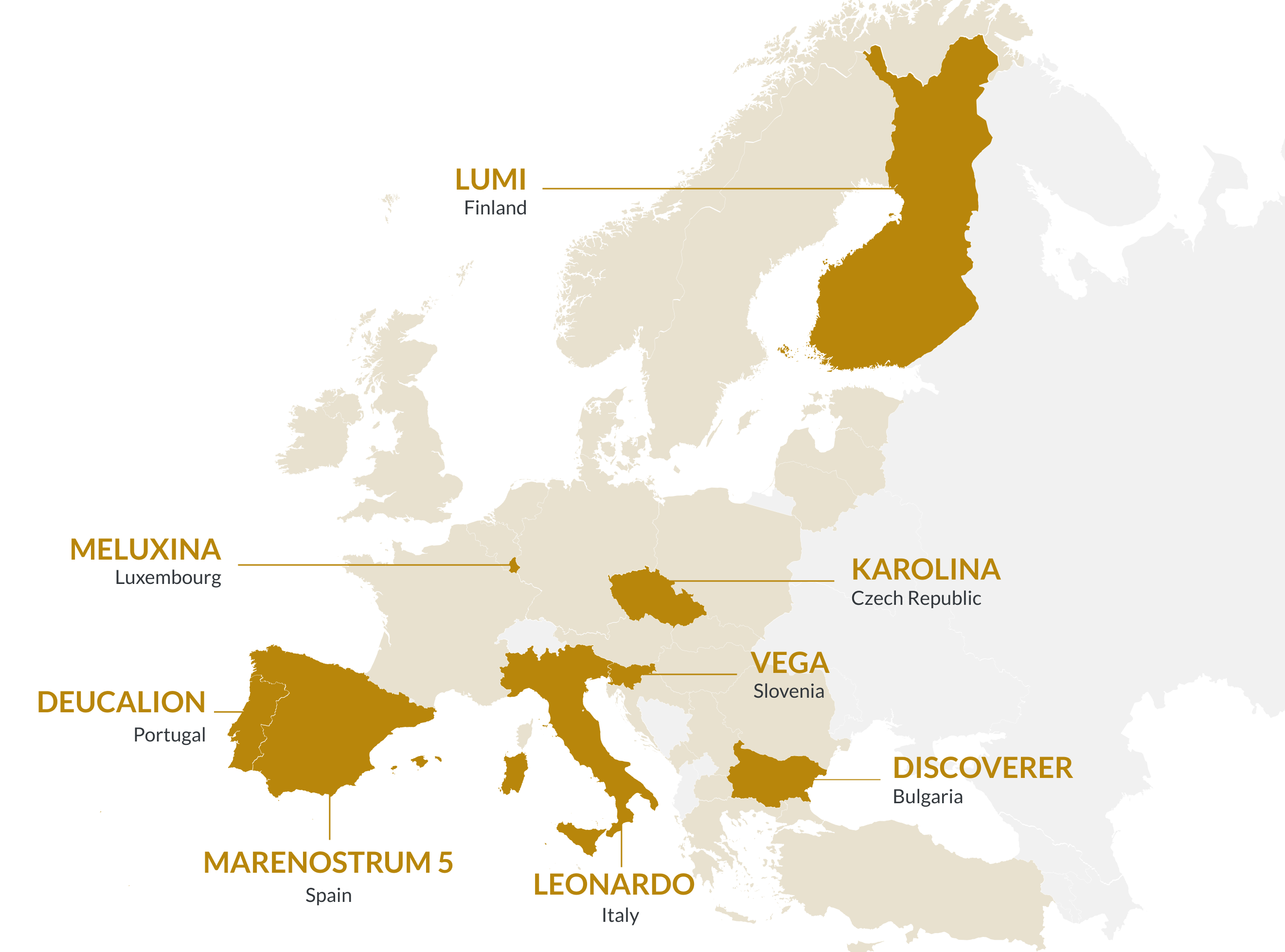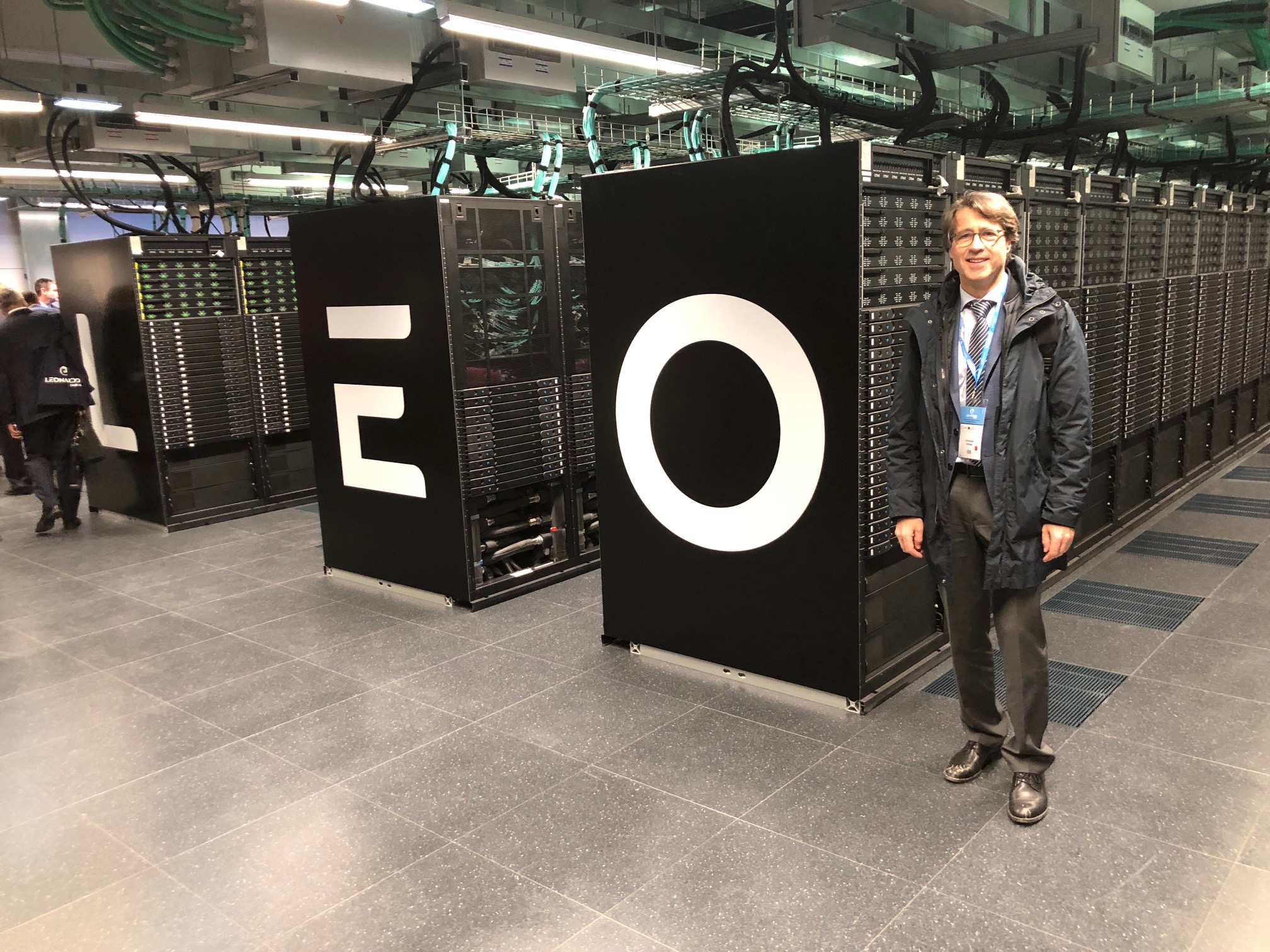HPC in Research and Industry - Christoph Dellago
Supercomputing in research and industry: Austria’s master plan
Christoph Dellago, Professor of Computational Physics and project lead of the competence centre EuroCC Austria, discusses the revolution that machine learning is currently sparking in science and industry. He explains how the EU project EuroCC supports users in implementing AI applications on European supercomputers and what the future of High-Performance Computing (HPC) might look like. Spoiler alert: HPC will soon be available to everyone.
Interview by Bettina Benesch
Christoph, what is the most exciting thing you are currently working on?
I work at the intersection of statistical physics and materials science, and there is a revolution happening. This revolution is called machine learning and artificial intelligence. New possibilities are emerging: in many areas, we can now perform calculations much faster with the help of machine learning methods than we could before. This is because we train AI to learn how to solve the Schrödinger equation (note: the Schrödinger equation underpins all of materials physics). Solving it is numerically very complex. Now there is a simpler method, namely through machine learning.
AI is, in a way, a shortcut. If this works out, we can simulate and calculate how atoms move and arrange themselves when certain processes occur and how this leads to the material properties that we want to predict. At the moment, there is a huge hype around this topic, but I am sure it is much more than just hype. These are things that will remain and fundamentally change how we conduct research in many areas. This applies not only to physics or chemistry but also to biology and other sciences.
One way to advance in this area is the EU project EuroCC. It has been running since 2021, and you are part of the team in Austria. What benefits does EuroCC offer to Austria as a research location?
I think we need to distinguish between immediate benefits and long-term developments. EuroCC is a project involving over 30 different European countries, creating opportunities for cooperation between the individual countries and their HPC centres, as well as between industry and academia. These contacts are established through training activities, networking events, and proof-of-concept projects.
Equally important is the long-term development: EuroCC is a project of the EuroHPC Joint Undertaking, a partnership between the European Union, member states, and industrial partners. By participating in this large project, Austria is also taking responsibility for developing the computing ecosystem. I think it is very important to stay engaged here. For me, this may even be the main impact of EuroCC: to contribute to ensuring that Austria is part of this development and has access to computing resources across Europe. These include supercomputers at European computing centres, including pre-exascale and exascale systems.
“
By participating in the EuroCC project, Austria is taking responsibility for the development of the computing ecosystem.
„
Can you give a brief interim assessment? Are there already positive changes thanks to EuroCC?
In the first project phase from 2021 to 2022, there were some successes, and now in the second phase, there have been some interesting projects where EuroCC has collaborated with companies on proof-of-concept projects: EuroCC does not take on programming work or data analysis for companies, but it supports the development of projects and access to high-performance computing resources. There have already been some successful projects: for example, with the company HAKOM in the energy sector for time series analysis, or a collaboration with the company Reintrieb to develop an innovative ship propulsion system.
Now, in the second phase of EuroCC, AI plays a crucial role. Recently, there was a success with the Supercomputing Accelerator, an initiative that supports companies with their HPC, AI, and big data projects through training, business plan development, and proof-of-concept projects. There was great interest from startups and SMEs, which surprised even us. Everyone has understood by now that HPC and AI are important areas. Everyone wants to benefit from it, and that is good.
How do you measure the success of EuroCC?
An important indicator for me is the interest that EuroCC activities generate among startups and SMEs. However, one must not forget: the EuroCC project is important, but I believe that all actors in Austria need to invest heavily in this area to enable long-term innovation.
Which actors are you referring to?
I mean universities, non-university research institutions, the public sector, and industry itself. All of them will need to invest in this area in the future.
The second project phase of EuroCC ends in 2025. Will there be a EuroCC part 3?
I expect there will be a EuroHPC-funded EuroCC 3 project because the demand is there. Especially because developments in AI require computing resources that are not trivial. I believe it is essential to further develop computing resources across Europe due to AI developments and their applications in all areas of science and industry.
The European Union has recognised that it is crucial not to fall behind in the context of global developments. At the same time, this project will seek further funding, and I think it will also be possible to find companies willing to pay for the services EuroCC offers.
New supercomputers are currently being built in Europe, including Austria's new system called MUSICA (Multi-Site Computing Austria) distributed across three locations. What other projects are there besides MUSICA?
Currently, several new pre-exascale supercomputers are operating in Europe. One of them is LEONARDO which is operated at the Italian HPC centre CINECA in Bologna. Austria is part of the LEONARDO consortium. Also two exascale systems are currently being built: one will be in Germany, and one in France. They will soon be operational and available to all users in Europe with the support of EuroCC.
How do you see things progressing beyond this?
Looking at the development of supercomputers in recent years, I am sure that it will not stop at these two exascale systems. However, I also believe that the question of energy efficiency will become a major issue: the more energy an HPC system or all HPC systems require, the more focus will be on sustainability. Therefore, a goal must be to reduce energy consumption and implement sustainable energy supply.
What challenges do you see ahead in terms of HPC and AI?
AI is, of course, a major challenge in itself because it is an extremely powerful tool that can also be misused. Establishing protocols to prevent this is definitely a very important matter.
In what direction do you think HPC is heading?
I believe high-performance computing will become more interactive: we will receive feedback faster in the research process and then make new calculations based on this feedback. AI will completely transform research. Predicting the future is always difficult, but I am sure that HPC will play an increasingly significant role – even in areas that do not currently use it.
The traditional domains of HPC are physics, chemistry, materials science, astronomy, or biology. Recently, we have seen increasing activity in other areas: sociology, linguistics, archaeology, and, of course, medicine. I expect this trend to continue in the future.
“
AI will completely transform research and HPC will play an increasingly important role in it.
„
Short bio
Christoph Dellago studied physics at the University of Vienna and then spent several years in the USA as a postdoc and professor. In 2003, he returned to his alma mater as a Professor of Computational Physics. Christoph currently holds various positions, including Director of the Erwin Schrödinger Institute for Mathematics and Physics, a seat on the steering committee of the Vienna Scientific Cluster, and involvement in the EuroCC project. In his current research, Christoph and his team focus on the properties of materials, including phase transitions (e.g., solid to liquid).
About the key concepts
Believe it or not, High-Performance Computing (HPC) is actually a relatively old concept: the word "supercomputing" was first used in 1929, and the first mainframe computers appeared in the 1950s. However, they had far less capacity than today's mobile phones. The technology really took off in the 1970s.
HPC systems are used whenever the personal computer's memory is too small, larger simulations are required that cannot be run on the personal system, or when what was previously calculated locally now needs to be calculated much more frequently.
The performance of supercomputers is measured in FLOPS (Floating Point Operations Per Second). In 1997, a supercomputer achieved 1.06 TeraFLOPS (1 TeraFLOPS = 10^12 FLOPS) for the first time; Austria's currently most powerful supercomputer, the VSC-5, reaches 2.31 PetaFLOPS or 2,310 TeraFLOPS (1 PetaFLOPS = 10^15 FLOPS). The era of exascale computers began in 2022, with performance measured in ExaFLOPS (1 ExaFLOPS = 10^18 FLOPS). An ExaFLOPS equals one quintillion floating-point operations per second.
As of June 2024, there were only two exascale systems in the TOP500 list of the world's best supercomputers: Frontier at Oak Ridge National Laboratory and Aurora at Argonne National Laboratory, both in the USA. In Europe, there are currently three pre-exascale computers, which are precursors to exascale systems. Two European exascale systems will be operational shortly.
VSC (Vienna Scientific Cluster) is Austria's supercomputer, co-financed by several Austrian universities. The computers are located at the TU Wien university in Vienna. From 2025, the newest supercomputer, MUSICA (Multi-Site Computer Austria), will be in use at locations in Vienna, Linz, and Innsbruck.
Researchers from the participating universities can use the VSC for their simulations, and under the EuroCC programme, companies also have easy and free access to computing time on Austria's supercomputer. Additionally, the VSC team is an important source of know-how: in numerous workshops, future HPC users, regardless of their level, learn everything about supercomputing, AI and big data.
EuroHPC Joint Undertaking is a public-private partnership of the European Union aimed at building a Europe-wide high-performance computing infrastructure and keeping it internationally competitive.
EuroCC is an initiative of EuroHPC.
Each participating country (EU plus some associated states) has established a national competence centre for supercomputing, big data and artificial intelligence – EuroCC Austria is one of them. They are part of the EuroCC project, which brings technology closer to future users and facilitates access to supercomputers. The goal of the project is to help industry, academia and private sector adopt and leverage HPC, AI and high-performance data analytics. EuroHPC also supports the EUMaster4HPC project, an educational programme for future HPC experts.

